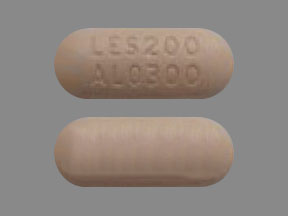Allopurinol / Lesinurad Dosage
Applies to the following strengths: 200 mg-200 mg; 300 mg-200 mg
Usual Adult Dose for:
Additional dosage information:
Usual Adult Dose for Gout
Initial dose:
- Patients taking allopurinol doses greater than 300 mg/day: Allopurinol 300 mg-lesinurad 200 mg orally once a day
- Patients taking allopurinol doses of 300 mg/day: Allopurinol 300 mg-lesinurad 200 mg orally once a day
- Patients taking allopurinol doses of 200 mg/day: Allopurinol 200 mg-lesinurad 200 mg orally once a day
Comments:
- This drug should be taken as an equivalent portion of the total daily allopurinol dose.
- Patients taking allopurinol concurrently with lesinurad should take this drug in place of lesinurad and at an equivalent portion of allopurinol.
- Gout flare prophylaxis should be considered in patients not currently taking lesinurad.
- Patients who develop gout flares during treatment should be managed; discontinuation of treatment is not necessary.
Use: Treatment of hyperuricemia associated with gout in patients who have not achieved target serum uric acid levels with medically appropriate doses of allopurinol alone
Renal Dose Adjustments
Prior to initiation:
- Mild to moderate renal dysfunction (CrCl greater than 45 mL/min): No adjustment recommended.
- Severe renal impairment (CrCl less than 45 mL/min): Contraindicated
During treatment:
- Mild renal dysfunction (CrCl greater than 60 mL/min): No adjustment recommended.
- Moderate renal dysfunction (CrCl 45 to 60 mL/min): Frequent monitoring recommended.
- Severe renal dysfunction (CrCl less than 45 mL/min): Discontinue use in patients with persistent severe renal dysfunction.
- Serum creatinine levels 1.5 to 2 times pretreatment levels: Frequent monitoring recommended.
- Serum creatinine levels greater than 2 times pretreatment level: Interrupt therapy; do not restart without another explanation for serum creatinine abnormalities.
Liver Dose Adjustments
Mild to moderate liver dysfunction (Child-Pugh Classes A and B): No adjustment recommended.
Severe liver dysfunction (Child-Pugh Class C): Not recommended.
Dose Adjustments
Patients taking azathioprine or mercaptopurine:
- Initial dose: Reduce the dose of azathioprine or mercaptopurine to approximately one-third to one-fourth of the usual dose.
- Subsequent doses: Adjustments should be made based upon therapeutic response and signs/symptoms of toxicity.
- Patients should be monitored for therapeutic response and signs/symptoms of toxicity.
Precautions
US BOXED WARNINGS:
RISK OF ACUTE RENAL FAILURE:
- Acute renal failure has occurred with lesinurad, one of the component of this drug.
Safety and efficacy have not been established in patients younger than 18 years.
Consult WARNINGS section for additional precautions.
Dialysis
Contraindicated
Other Comments
Administration advice:
- Patients should take this drug with food and water in the morning.
- Treatment should not be combined with additional doses of lesinurad.
General:
- Limitation of use: This drug is not recommended to treat asymptomatic hyperuricemia.
- Use is not recommended for patients taking allopurinol doses less than 300 mg/day (or 200 mg/day in those with a CrCl less than 60 mL/min).
- Patients should stay well-hydrated during treatment (e.g. 2 L/day).
- Gout flares may occur during treatment due to uric acid level changes via mobilization of urate from tissue deposits.
Monitoring:
- Hematologic: Prothrombin time periodically in patients receiving coumarin anticoagulants
- Hepatic: Liver function tests, especially in patients with preexisting liver dysfunction and those who develop anorexia, weight loss, or pruritus
- Other: Toxicity, therapeutic response (in patients taking azathioprine or mercaptopurine concomitantly)
- Renal: Renal function tests prior to initiation and periodically thereafter
Patient advice:
- Patients should be instructed to stay well-hydrated during treatment (e.g., 2 L of liquid per day).
- Patients should be told to immediately report signs/symptoms of skin rashes, hypersensitivity reactions, hepatotoxicity, and/or uric acid nephropathy (e.g., flank pain, nausea, vomiting).
- Inform patients that gout flares may occur, and they should not stop taking this drug if a gout flare occurs.
- This drug may cause drowsiness; have patients avoid driving or operating machinery until adverse effects are determined.
More about allopurinol / lesinurad
- Check interactions
- Compare alternatives
- Side effects
- During pregnancy
- Drug class: antihyperuricemic agents
Patient resources
Other brands
Professional resources
Other brands
Related treatment guides
See also:
Further information
Always consult your healthcare provider to ensure the information displayed on this page applies to your personal circumstances.


